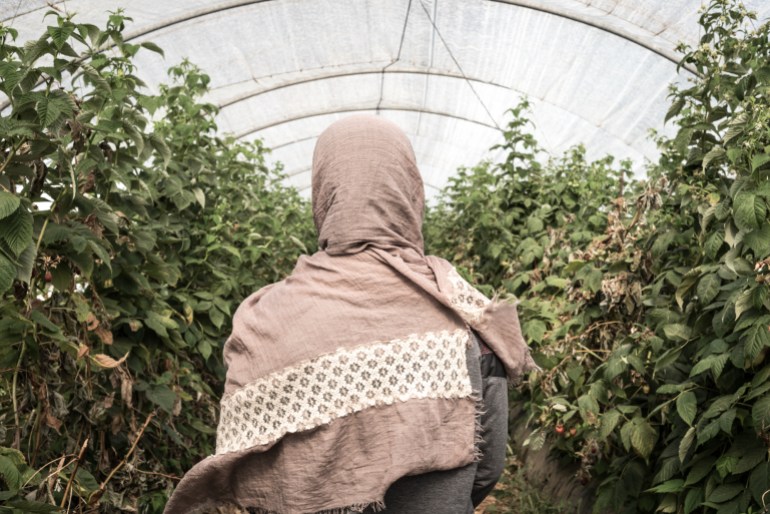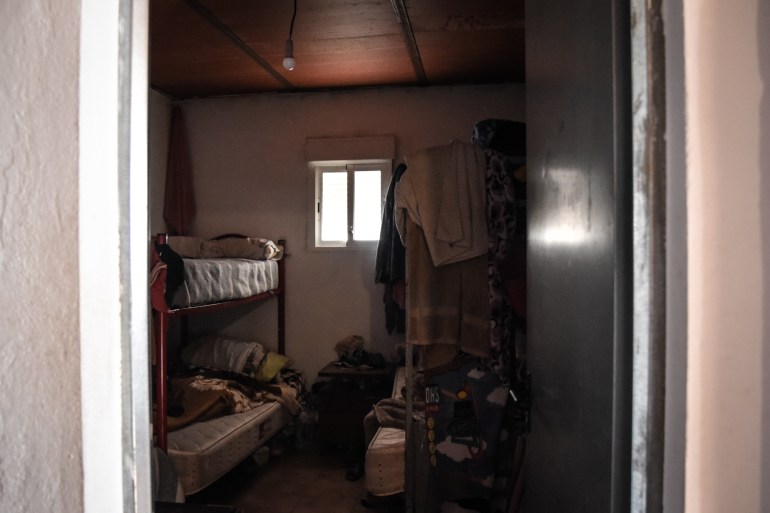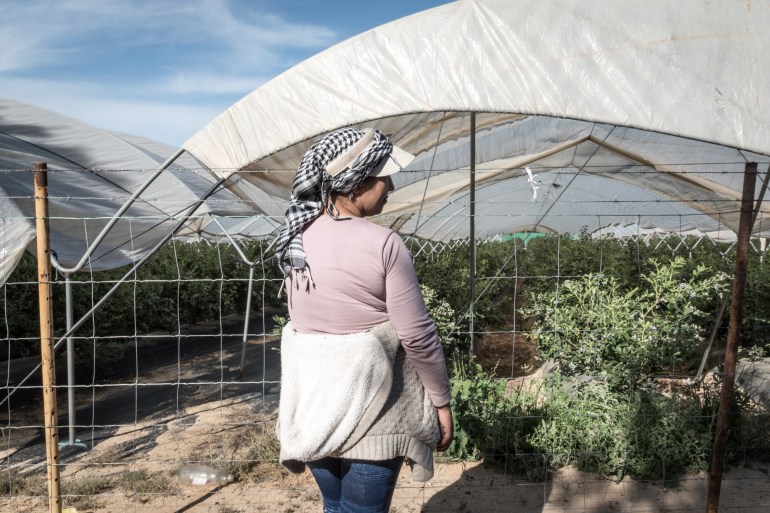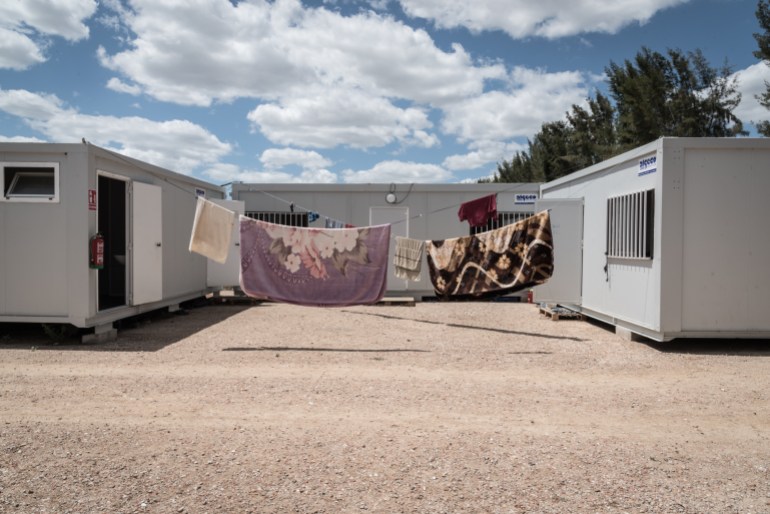Farm bosses routinely sexually harass and exploit seasonal workers who pick the red fruit that lines shelves in European supermarkets, investigation reveals.

Women fruit pickers in Spain, often from Morocco or Eastern Europe, are being exploited as they attempt to support themselves and families back home [Stefania Prandi/Al Jazeera]
10 Jul 2021
*The names of all workers in this article have been changed to protect their identities.
Huelva, Spain – It is mid-May and the hot air is filled with the sugary scent of strawberries mixed with fertiliser as Jadida*, a Moroccan woman, walks on the side of the road, a farm behind her. A large pair of sunglasses covers her face, almost entirely. Greenhouses surround her as far as the eye can see.
KEEP READINGRape, abuses in palm oil fields linked to top cosmetic brands: APPhotos: Death and despair as African migrants arrive in SpainCalls for Spain to regularise migrant who rescued strangersCaught on camera: Libyan coastguard shoots at migrant boat
Jadida had told her colleagues she was going grocery shopping, so on the way back she must pass by the shops to avoid their suspicions, she says as she begins the interview.
Talking to the migrant workers who pick strawberries in Europe’s biggest red fruit producing region, the Huelva province in Spain, is not easy. The fields are fenced, and in many places there are surveillance cameras, guards and electric gates which close as soon as strangers approach.
But after these reporters handed out their phone numbers to a group of strawberry pickers in the area, inviting them to be interviewed, Jadida called back because she wanted to share her experiences of sexual abuse, allegedly by her supervisor.
At first, he was kind to her. But on her second day at work, he tried to persuade her to join him in his room. She refused, and he began calling her phone constantly. Eventually, he approached her when she was working in the fields and tried to pressure her into having sex with him.
Continuously rejecting him has had consequences. The supervisor now threatens to have her fired and sent back to Morocco.
“He tells the other bosses that I am lazy and not working. He gets me in trouble and accuses me of things that I haven’t done,” Jadida told Al Jazeera.
She is one of thousands of women – among them many Moroccans and Romanians – who each year spend three to six months picking strawberries, raspberries and blueberries underneath the “sea of plastic” of Huelva.
*The names of all workers in this article have been changed to protect their identities.
Huelva, Spain – It is mid-May and the hot air is filled with the sugary scent of strawberries mixed with fertiliser as Jadida*, a Moroccan woman, walks on the side of the road, a farm behind her. A large pair of sunglasses covers her face, almost entirely. Greenhouses surround her as far as the eye can see.
KEEP READINGRape, abuses in palm oil fields linked to top cosmetic brands: APPhotos: Death and despair as African migrants arrive in SpainCalls for Spain to regularise migrant who rescued strangersCaught on camera: Libyan coastguard shoots at migrant boat
Jadida had told her colleagues she was going grocery shopping, so on the way back she must pass by the shops to avoid their suspicions, she says as she begins the interview.
Talking to the migrant workers who pick strawberries in Europe’s biggest red fruit producing region, the Huelva province in Spain, is not easy. The fields are fenced, and in many places there are surveillance cameras, guards and electric gates which close as soon as strangers approach.
But after these reporters handed out their phone numbers to a group of strawberry pickers in the area, inviting them to be interviewed, Jadida called back because she wanted to share her experiences of sexual abuse, allegedly by her supervisor.
At first, he was kind to her. But on her second day at work, he tried to persuade her to join him in his room. She refused, and he began calling her phone constantly. Eventually, he approached her when she was working in the fields and tried to pressure her into having sex with him.
Continuously rejecting him has had consequences. The supervisor now threatens to have her fired and sent back to Morocco.
“He tells the other bosses that I am lazy and not working. He gets me in trouble and accuses me of things that I haven’t done,” Jadida told Al Jazeera.
She is one of thousands of women – among them many Moroccans and Romanians – who each year spend three to six months picking strawberries, raspberries and blueberries underneath the “sea of plastic” of Huelva.

Jadida says her boss tries to pressure her into sex by continually harassing her by phone and approaching her physically [Stefania Prandi/Al Jazeera]
Al Jazeera, in collaboration with the Danish investigative media outlet Danwatch, interviewed 16 female farm workers, all of whom had contracts with the seven largest red fruit producers who sell to well-known supermarkets in the UK, France, Belgium, Netherlands, Denmark, Germany and Sweden.
Most workers recounted daily humiliations, such as penalties for taking toilet breaks, union busting and little or no protection against COVID-19. Several reported sexual harassment and being blackmailed for sex.
According to Jadida, many of her colleagues do not dare to reject the supervisor.
The only other worker she knows who did so was frequently seen crying in the greenhouses and eventually moved to another part of the farm, Jadida claims.
“As soon as I get out of here, I want him arrested,” she says.
Strawberry pickers with temporary work visas have few opportunities to report harassment and abuse.
Most arrive as part of a bilateral “contracting in origin” agreement between Morocco and Spain which in 2019 alone, saw almost 20,000 Moroccan women pick Spanish strawberries.
According to the deal, migrants lose the opportunity to work in Spain if they leave their Spanish workplace for any reason.
Furthermore, it emphasises that the Moroccan state recruitment agency ANAPEC must ensure that migrant workers return to Morocco when the season ends. Scholars and NGOs say this is why ANAPEC demands that hopeful workers must show evidence that they have children under the age of 14 at home – so that they have something they must return to.
The women stay in small apartments – barracks and containers in between the greenhouses, far from any town centre.
Isolated and reliant on temporary work visas, they are extremely dependent on their employers’ mercy, not only for security but also basic health standards, unions and local NGOs claim
Al Jazeera, in collaboration with the Danish investigative media outlet Danwatch, interviewed 16 female farm workers, all of whom had contracts with the seven largest red fruit producers who sell to well-known supermarkets in the UK, France, Belgium, Netherlands, Denmark, Germany and Sweden.
Most workers recounted daily humiliations, such as penalties for taking toilet breaks, union busting and little or no protection against COVID-19. Several reported sexual harassment and being blackmailed for sex.
According to Jadida, many of her colleagues do not dare to reject the supervisor.
The only other worker she knows who did so was frequently seen crying in the greenhouses and eventually moved to another part of the farm, Jadida claims.
“As soon as I get out of here, I want him arrested,” she says.
Strawberry pickers with temporary work visas have few opportunities to report harassment and abuse.
Most arrive as part of a bilateral “contracting in origin” agreement between Morocco and Spain which in 2019 alone, saw almost 20,000 Moroccan women pick Spanish strawberries.
According to the deal, migrants lose the opportunity to work in Spain if they leave their Spanish workplace for any reason.
Furthermore, it emphasises that the Moroccan state recruitment agency ANAPEC must ensure that migrant workers return to Morocco when the season ends. Scholars and NGOs say this is why ANAPEC demands that hopeful workers must show evidence that they have children under the age of 14 at home – so that they have something they must return to.
The women stay in small apartments – barracks and containers in between the greenhouses, far from any town centre.
Isolated and reliant on temporary work visas, they are extremely dependent on their employers’ mercy, not only for security but also basic health standards, unions and local NGOs claim
.

Yasmine describes how she had a miscarriage at work and was bleeding in the fields for a month before being taken to the doctors [Stefania Prandi/Al Jazeera]
One worker, 29-year-old Yasmine*, said she was pregnant when she began working for a major strawberry supplier. After two weeks in the fields, she miscarried. She bled and asked her supervisor to be taken to the doctor, but he said she would have to pay 20 euros ($24) for the gas.
Two weeks later, when her condition had still not improved, he eventually took her to a clinic, which immediately referred her to the hospital.
“I was bleeding on my clothes. Everyone could see it,” she said.
While unions and NGOs stress the temporary workers’ lack of legal certainty, the situation is considerably worse for undocumented migrant workers who cannot file charges for abuse without risking being reported to the police and deported.
“If a man likes a female employee, he harasses her. That’s just how it is,” said Hadiya*, standing in front of her home, approximately two and a half metres from the nearest row of plastic-covered blueberry bushes.
The small shed she lives in is made up of discarded greenhouse parts, wooden pallets and plastic tarpaulins.
It is in one of the many temporary settlements that house some of the undocumented migrants working in Spanish agriculture.
When Hadiya’s work visa from Morocco expired two years ago, she became undocumented. Since then, managers repeatedly asked her for sex in two farms where she picked strawberries.
When that happened, “it [was] time to find another workplace”, she said.
One worker, 29-year-old Yasmine*, said she was pregnant when she began working for a major strawberry supplier. After two weeks in the fields, she miscarried. She bled and asked her supervisor to be taken to the doctor, but he said she would have to pay 20 euros ($24) for the gas.
Two weeks later, when her condition had still not improved, he eventually took her to a clinic, which immediately referred her to the hospital.
“I was bleeding on my clothes. Everyone could see it,” she said.
While unions and NGOs stress the temporary workers’ lack of legal certainty, the situation is considerably worse for undocumented migrant workers who cannot file charges for abuse without risking being reported to the police and deported.
“If a man likes a female employee, he harasses her. That’s just how it is,” said Hadiya*, standing in front of her home, approximately two and a half metres from the nearest row of plastic-covered blueberry bushes.
The small shed she lives in is made up of discarded greenhouse parts, wooden pallets and plastic tarpaulins.
It is in one of the many temporary settlements that house some of the undocumented migrants working in Spanish agriculture.
When Hadiya’s work visa from Morocco expired two years ago, she became undocumented. Since then, managers repeatedly asked her for sex in two farms where she picked strawberries.
When that happened, “it [was] time to find another workplace”, she said.

Women live crammed in containers and small houses without anti-COVID measures [Stefania Prandi/Al Jazeera]
It is not clear how many migrant labourers work in Spain.
Last year, the Catholic charity Caritas estimated that in Huelva, Almería and Tenerife “more than 12,000 migrants live in extremely unsanitary conditions, lacking direct access to water and sanitation and with no COVID-19 preventive measures other than hygienic kits supplied by civil society organisations”.
A study published by the Foundation for Applied Economic Studies this year estimates the total number of undocumented migrants living in Spain to be 500,000.
According to an EU Parliament briefing in February, most legal foreign guest workers in Huelva are “Eastern Europeans, followed by Africans – mostly Moroccan women – and Latin Americans”.
The report added: “Hundreds of sub-Saharan migrants live year-round in shantytowns close to the fields. Spain’s agricultural model has been questioned for years because of the poor working and living conditions of its migrant workers.”
Asked if she has witnessed sexual harassment on the farms, Saeeda*, another undocumented Moroccan worker from the settlement, exclaimed: “Well, yes!
“When the manager hires a woman, he demands something in return.”
It is not clear how many migrant labourers work in Spain.
Last year, the Catholic charity Caritas estimated that in Huelva, Almería and Tenerife “more than 12,000 migrants live in extremely unsanitary conditions, lacking direct access to water and sanitation and with no COVID-19 preventive measures other than hygienic kits supplied by civil society organisations”.
A study published by the Foundation for Applied Economic Studies this year estimates the total number of undocumented migrants living in Spain to be 500,000.
According to an EU Parliament briefing in February, most legal foreign guest workers in Huelva are “Eastern Europeans, followed by Africans – mostly Moroccan women – and Latin Americans”.
The report added: “Hundreds of sub-Saharan migrants live year-round in shantytowns close to the fields. Spain’s agricultural model has been questioned for years because of the poor working and living conditions of its migrant workers.”
Asked if she has witnessed sexual harassment on the farms, Saeeda*, another undocumented Moroccan worker from the settlement, exclaimed: “Well, yes!
“When the manager hires a woman, he demands something in return.”

Saeeda was living in an informal settlement for migrant workers before parts of the camp burned down. She died in the fire [Stefania Prandi/Al Jazeera]
Saeeda’s fate tells another story about conditions for undocumented migrants in Spain. Three days after our interview with her, her shack caught fire. This happens often in these settlements, which do not adhere to Spanish fire regulations.
Saeeda was found dead. The 39-year-old was the sole breadwinner for her teenage son who lives with his elderly grandmother in Morocco. She had not seen them for two years when she passed.
According to Angels Escrivà, associate professor at Huelva University and part of the Mujeres 24H network that supports women migrant workers, the strawberry industry initially recruited Moroccan men.
“But the employers thought the men were not docile enough; they were forming unions and in the 2000s there were even riots. So they opted for women,” she said.
Female farm workers are however far from “docile”.
In the past few years, an increasing number have taken red fruit producers to court over exploitation issues.
In 2018, 10 Moroccan women filed lawsuits against Spanish strawberry producer Doñaña 1998, which they accused of assault, sexual harassment, rape and trafficking. That same year, four other women sued an unnamed strawberry exporter for sexual harassment and gross labour exploitation.
A provincial court in Huelva has rejected the Doñaña 1998 workers’ case and they are now awaiting a decision from a labour court. Their lawyer has appealed the case to the constitutional court.
In the second case, a labour court rejected the case of the four women. They have appealed and are still waiting for a criminal court to hear their claims.
These reporters have been in contact with another former strawberry picker who is currently suing a large red fruit exporter on similar charges.
Spanish authorities said they were unable to disclose how many of such cases are continuing. But neither Angels Escrivà nor the lawyer of the four women said they knew of cases won by migrant female agricultural workers.
In 2018, migrant and Spanish female workers organised themselves in Jornaleras de Huelva en Lucha (Female Day Labourers who Fight), a grassroots union focused on the needs of the labourers.
“There is this incorrect idea that migrant women do not organise themselves. Instead, they get together and resist,” said Ana Pinto, a spokesperson from the group.
In response to claims of sexual abuse at farms, the Spanish minister of labour Yolanda Díaz has said that workplaces would be inspected.
She was not available for an interview for this article. Neither were the industry associations Freshuelva and Interfresa.
Antonio Alvarado Barroso, chief of Huelva’s department for Labour and Immigration, did not respond directly to questions on sexual harassment, but offered a brief comment. “The more inspections that are carried out, the better,” he said.
To protect workers’ identities, it has not been possible to confront the individual companies concerning the personal stories about sexual harassment.
Saeeda’s fate tells another story about conditions for undocumented migrants in Spain. Three days after our interview with her, her shack caught fire. This happens often in these settlements, which do not adhere to Spanish fire regulations.
Saeeda was found dead. The 39-year-old was the sole breadwinner for her teenage son who lives with his elderly grandmother in Morocco. She had not seen them for two years when she passed.
According to Angels Escrivà, associate professor at Huelva University and part of the Mujeres 24H network that supports women migrant workers, the strawberry industry initially recruited Moroccan men.
“But the employers thought the men were not docile enough; they were forming unions and in the 2000s there were even riots. So they opted for women,” she said.
Female farm workers are however far from “docile”.
In the past few years, an increasing number have taken red fruit producers to court over exploitation issues.
In 2018, 10 Moroccan women filed lawsuits against Spanish strawberry producer Doñaña 1998, which they accused of assault, sexual harassment, rape and trafficking. That same year, four other women sued an unnamed strawberry exporter for sexual harassment and gross labour exploitation.
A provincial court in Huelva has rejected the Doñaña 1998 workers’ case and they are now awaiting a decision from a labour court. Their lawyer has appealed the case to the constitutional court.
In the second case, a labour court rejected the case of the four women. They have appealed and are still waiting for a criminal court to hear their claims.
These reporters have been in contact with another former strawberry picker who is currently suing a large red fruit exporter on similar charges.
Spanish authorities said they were unable to disclose how many of such cases are continuing. But neither Angels Escrivà nor the lawyer of the four women said they knew of cases won by migrant female agricultural workers.
In 2018, migrant and Spanish female workers organised themselves in Jornaleras de Huelva en Lucha (Female Day Labourers who Fight), a grassroots union focused on the needs of the labourers.
“There is this incorrect idea that migrant women do not organise themselves. Instead, they get together and resist,” said Ana Pinto, a spokesperson from the group.
In response to claims of sexual abuse at farms, the Spanish minister of labour Yolanda Díaz has said that workplaces would be inspected.
She was not available for an interview for this article. Neither were the industry associations Freshuelva and Interfresa.
Antonio Alvarado Barroso, chief of Huelva’s department for Labour and Immigration, did not respond directly to questions on sexual harassment, but offered a brief comment. “The more inspections that are carried out, the better,” he said.
To protect workers’ identities, it has not been possible to confront the individual companies concerning the personal stories about sexual harassment.

Female workers are kept isolated in barbed wired barracks in between thousands of greenhouses [Stefania Prandi/Al Jazeera]
SOURCE: AL JAZEERA
No comments:
Post a Comment